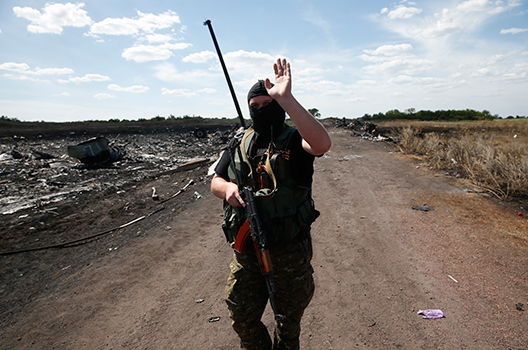
Calls for Probe of Flight MH17 Will Disturb Back-Room Policymaking
The shooting down of the Malaysian airliner by the Russian-led insurgents in southeastern Ukraine appears to have awakened Europe’s conscience. The principal powers in the EU had been able thus far in the Ukraine crisis to avoid directly accusing the Kremlin of responsibility for the disorder in Ukraine’s southeast. They had sanctioned Moscow three times for failing to rein in “the pro-Russian separatists,” but those measures were notably weaker than the sanctions issued from Washington. This encouraged Mr. Putin to believe that, due to its economic interests in Russia, the EU would not act decisively against Kremlin aggression in Ukraine.
The destruction of the airliner, however, introduced the Russian operation to the European public. The evidence pointed overwhelmingly to the separatists’ responsibility for the deaths of 298 passengers and crew of Flight MH17. The separatists’ refusal to permit international observers unrestricted access to the crash sites, and their obstruction of a prompt return of the deceased to their loved ones has fueled anger across Europe (as well as in Malaysia and Australia). While relatives were mourning the dead, the insurgents were looting their possessions.
Until a supersonic, radar-guided missile slammed into the airliner, Europe’s handling of the Ukraine crisis was done in private, subject principally to the lobbying of special interests who wanted calm relations with the Kremlin. Suddenly, that conversation is to include European public opinion – an opinion that does not want to hear about Russian gas or business profits coming from trade with Moscow. It wants to know why the Kremlin supplied the insurgents with missiles that could take out a civilian aircraft and why a proper investigation of the tragedy has not begun.
The politicians across the Old Continent have taken notice. British PM David Cameron wrote an excellent op-ed essay this past weekend warning Russia that if its behavior toward Ukraine does not change, there will be severe repercussions. Dutch PM Rutte issued a similar statement, which is particularly notable because heretofore the Netherlands had been a strong opponent of strong EU sanctions against Moscow. Chancellor Merkel, whose first inclination right after the crash was that it was too early to discuss additional sanctions, quickly change her tune and began to demand that the Kremlin exert influence on the insurgents. EU foreign ministers are to meet this week to discuss sanctions.
This does not mean that robust European sanctions are a certainty. The same strong and short-sighted economic interests are in the game and they will try to influence the process from the shadows. Their problem and the problem for the politicians who prefer to coddle Mr. Putin is that with the public focused on this, those shadows are yielding to light.
John E. Herbst directs the Dinu Patriciu Eurasia Center at the Atlantic Council. He served as US ambassador to Ukraine from 2003 to 2006.
Image: An armed pro-Russian separatist gestures to reporters at the crash site of Malaysia Airlines Flight MH17, near the village of Hrabove (Grabovo), Donetsk region on July 21, 2014. PHOTO: REUTERS/Maxim Zmeyev
